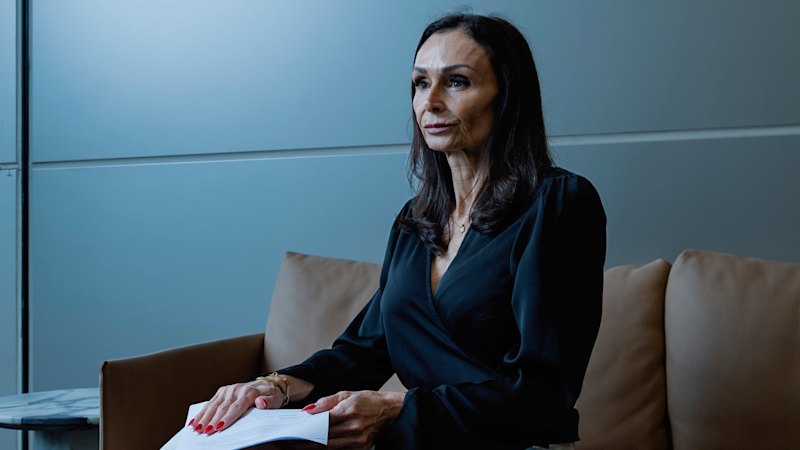
Last year, renowned chef Teage Ezard, aged 59, was diagnosed with multiple system atrophy (MSA), a rare and incurable neurological disorder. As his symptoms progress, Teage and his wife, Tina, 54, reflect on their past, confront their present, and ponder an uncertain future.
Teage Ezard: “I never thought I’d have an incurable disease, but it’s happened. It’s rare, it’s in the brain. I’ve done my best to prepare Tina for my demise. When I met her in my late 30s, I had the world at my feet. Now I’ve lost my purpose, potential, energy, and independence, and she’s the primary caregiver for me and our teenage son and daughter. She’s my rock.”
Teage’s journey from a high-flying chef to a man battling a debilitating disease is a poignant narrative of love and resilience. The couple met at the Melbourne Grand Prix in 2003, where Teage was a celebrated culinary figure with his restaurant, Ezard, on the brink of achieving three Good Food Guide hats.
The Rise of a Culinary Star
Teage Ezard’s culinary career was marked by innovation and success. His Melbourne CBD restaurant, Ezard, was a beacon of fine dining, attracting accolades and a loyal clientele. Cooking provided him with purpose and discipline, a stark contrast to his tumultuous upbringing.
“I’d enter the kitchen at 10am, put on Mozart, drink a VB. If you cut your finger, you’d stick it in hot oil,” Teage recalls of his early days in the kitchen, a testament to his dedication and passion for the craft.
His relationship with Tina brought stability to his life. “Tina wasn’t just attractive, she was stable. We had very different upbringings. She had a mum and dad, a home. My mum was on welfare and I moved 17 times as a kid,” he shares.
The Impact of MSA
Teage’s diagnosis of MSA cerebellar type in October 2022 was both a relief and a challenge. The disease, which affects movement, balance, and autonomic functions, has no known cure. “I was scared of dying after the initial shock of the diagnosis, but I’ve accepted time isn’t on my side,” Teage admits.
“It’s hard to have your independence taken away. Tina reassures me … Her strength and patience leave me in awe.” — Teage Ezard
The disease has brought Teage closer to his children, as he reassures them that MSA is not hereditary. Tina’s unwavering support has been crucial in navigating this new chapter of their lives.
A Partner’s Perspective
Tina Ezard: “When we met, work was my everything, and I was happy to cruise through life and have a baby on my own. I was working at the grand prix as a business development manager for a mineral water brand. We’d invited some high-profile chefs along, and Teage was one of them.”
Tina reflects on their early days, when Teage’s vulnerability and passion for life drew her in. “He was open, passionate about life. He’d been doing therapy, trying to find how broken he was and why his relationships fell apart. He was vulnerable. He’d say things like ‘see how bright the sky is?’ He was really raw and I enjoyed that.”
The couple’s life was a whirlwind of restaurant openings and culinary adventures, but the onset of Teage’s symptoms in 2016 marked a turning point. By 2017, Teage had become withdrawn and anxious, and the COVID-19 pandemic exacerbated his depression and apathy.
Facing the Future
The decision to close Ezard in 2020 was a difficult one, but necessary for Teage’s mental health. “It’s hard when you’ve been so successful and then, all of a sudden, it’s gone,” Tina reflects. The couple has since focused on celebrating Teage’s life and cherishing their time together.
“You lose parts of the person before they’re physically gone.” — Tina Ezard
Loving someone with a progressive, incurable disease has forced Tina into a continuous state of grief. “Even when you’re in the same room, the distance grows. You lose parts of the person before they’re physically gone: his independence, speech, intimacy, shared jokes, late-night talks, spontaneous hugs, the conversations you didn’t know were precious.”
Despite the challenges, the Ezards remain committed to their family. Their daughter, Sienna, is preparing for high-school exams, while their son, Kingston, navigates adolescence without the father who once guided him in the kitchen. “I’ve lost a partner but, for the most part, I carry my grief silently. Someone has to hold it all together,” Tina concludes.
The Ezards’ story is a testament to the power of love and resilience in the face of adversity. As they continue to navigate the complexities of MSA, their journey serves as an inspiration to others facing similar challenges.







